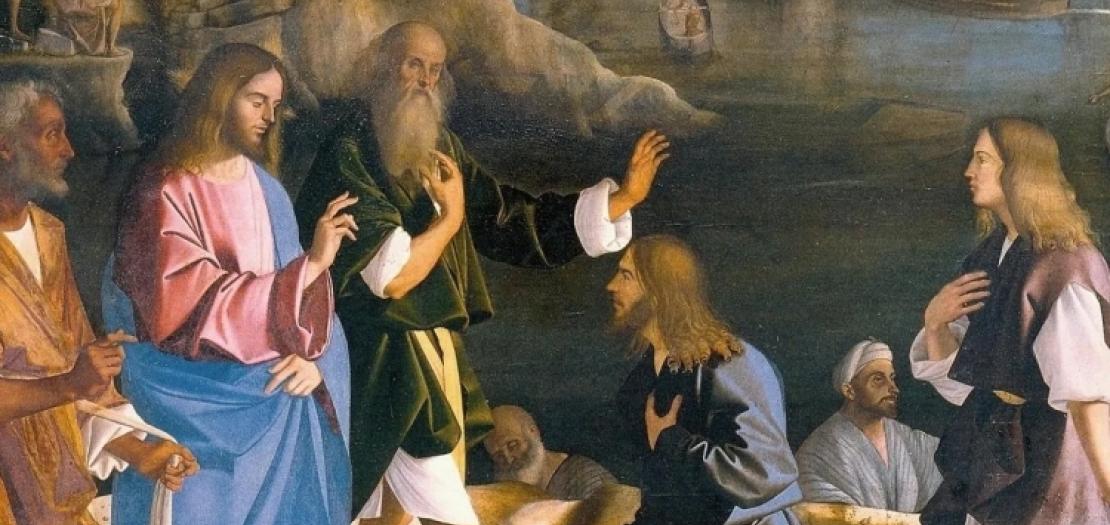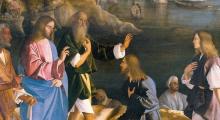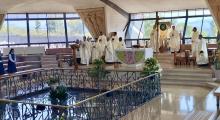Issued by the Catholic Center for Studies and Media - Jordan. Editor-in-chief Fr. Rif'at Bader - موقع أبونا abouna.org

Following is the text of meditation by Cardinal Pierbattista Pizzaballa, Latin Patriarch of Jerusalem for the 29th Sunday of ordinary time, dated October 20, 2024:
Jesus goes up to Jerusalem with His own, but they are afraid because they suspect what might happen to Jesus and themselves in the Holy City. In fact, Jesus tells them exactly what awaits Him: His glory, which will be revealed when He is lifted up on the cross. For the third time, Jesus announces His destiny of passion, death and resurrection, a time when he will surrender himself completely to the obedience of the Father and give himself up.
In this dramatic context, the evangelist Mark reports that the two brothers James and John approach Him with an unusual-sounding question. A question in which the roles are reversed and Jesus is asked to obey their will (“we want you to do for us whatever we ask of you.” (Mark 10:35)
They ask to occupy a privileged position in which they are given an honor that distinguishes them from others: namely, they ask not only to be with Jesus in glory, but also to be in a unique position, as those on the right and on the left, as those who occupy the best place “Grant us to sit, one at your right hand and one at your left, in your glory.” (Mark 10:37)
The two disciples sense that Jesus will soon enter Jerusalem and that he will finally reveal his glory there, and they endeavor to secure a piece of this fame and power for themselves. The disciples think about a human power that they want to share in as Jesus talks about the Cross.
Jesus' answer serves to show them that the vocation to which we are called is greater than any human honor we can receive in life.
Jesus therefore answers them that they do not know what they are asking for “You do not know what you are asking” (Mk. 10:38) not because they are mistaken when they ask for the ultimate life and glory, but only because they are deceiving themselves when they realize what that glory really is.
Jesus’ answer consists of three steps.
In the first, he focuses on the essentials, on what constitutes true glory “Are you able to drink the cup that I drink, or be baptized with the baptism that I am baptized with?” (Mark 10:38) The cup and baptism are metaphors for Jesus’ passion and death. True glory, then, is the fullness of a given life poured out on one's brothers and sisters so that all may live. It is not about filling places, but making room, giving life.
Each person counts for their own capacity to love, and life generously provides us with opportunities to do so: In Jerusalem, life will offer Jesus a cup to drink and a baptism in which to be baptized, will offer events in which Jesus can choose glory, that is, to keep on loving, even in a context of unjust human suffering.
This choice, the consent to the logic of gift and love, is what builds life, what gives fulfillment to our personhood: if we give up, something of us remains unfinished, remains outside of glory.
The disciples say, as if to justify themselves, that they are able to live like this, to drink this cup, to be baptized (“They answered him: ‘We are able’.” (Mark 10:39)
And here is the second step.
It is true that the disciples demand a position of power, but Jesus answers them first by stepping out of a position of dominance and power: it is not for Him to determine who will rule, who will be at His right hand and who will be at His left. (“It is not mine to grant” Mark 10:40) Only the Father can do that.
The glory of Jesus does not come with human power, but with the obedience of a son.
And if we are sons, we will all be in glory, all at his right hand and at his left, but on condition that we do not demand it and above all do not exclude others, as James and John had tried to do.
We see in the following text how widespread the logic of dominion and power was among the disciples: For when they saw what was happening, the other disciples were indignant with James and John “When the ten heard this, they began to be angry.” (Mark 10:41), like those who feel excluded, like someone who is offended when what rightfully belongs to him is taken away.
So the third part of the answer is no longer addressed to the two brothers, but to everyone, as if to say that we are all equally sick of this thirst for glory that robs us of the joy of life as brothers.
The key word that Jesus offers for a new look at true glory is the word service. “Whoever wishes to become great among you must be your servant.” (Mark 10:43) A service that is not lived as a moral virtue, not as an ascetic effort, but looking to Him, the Son, the Lord: “For the Son of Man came not to be served but to serve, and to give his life a ransom for many.” (Mark 10:45)
This passage is an important clue to method, for it says what the Christian style is in the affairs of the world, of politics, of human power, of pride in all its various forms. We cannot have Jesus without the cross. In him we not only have God's forgiveness of our sins through the death of Jesus (although that is of course central). The cross is God's way of subverting all human powers that imagine they can fix the world with power logics. At best, they will be able to replace one form of power with another. Only the logic of the cross can challenge human pride and glory.
+ Pierbattista







